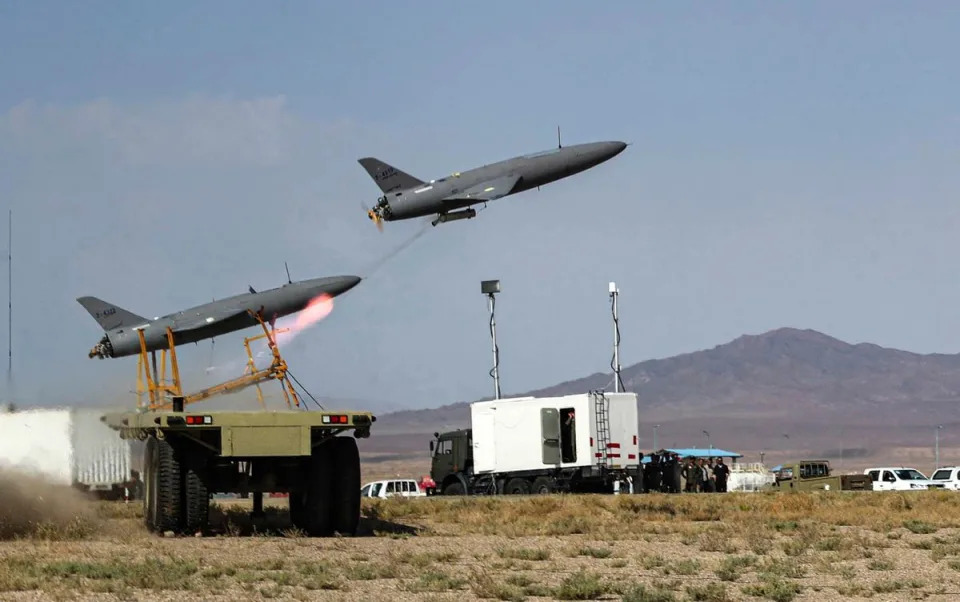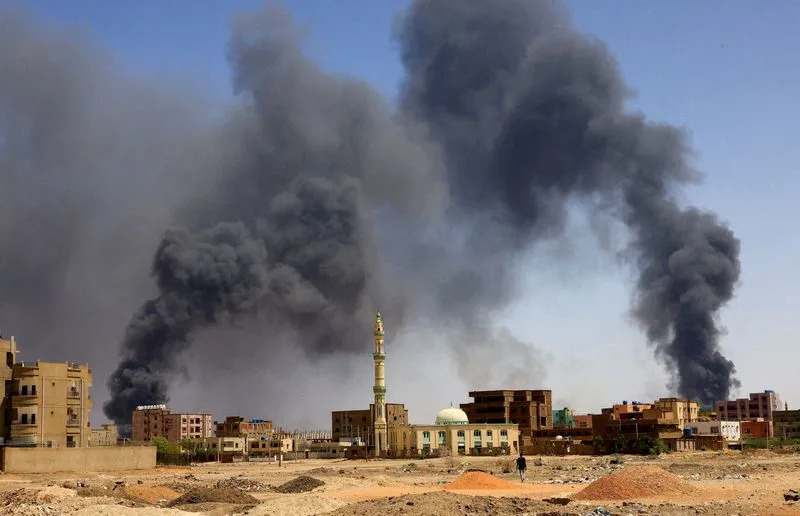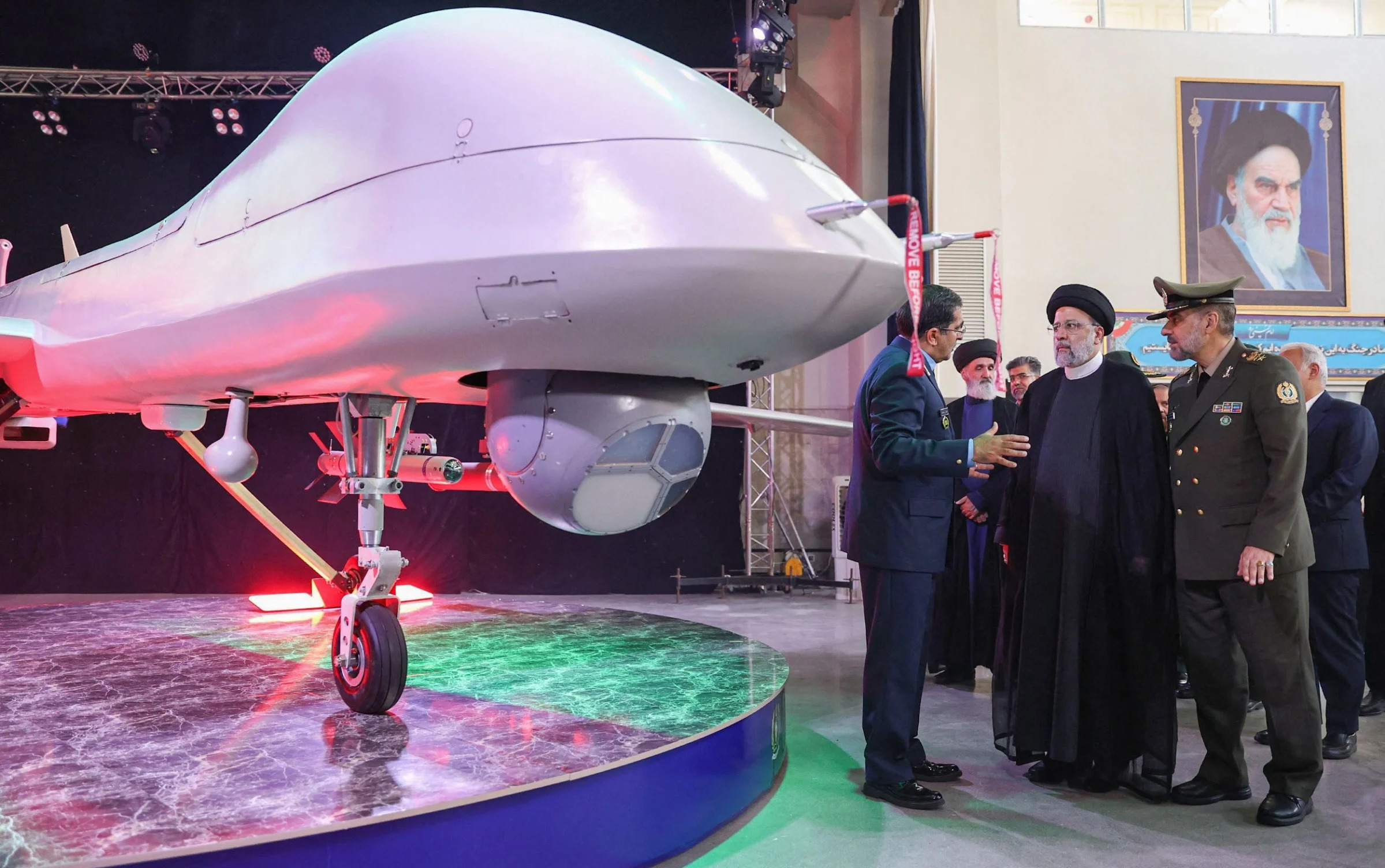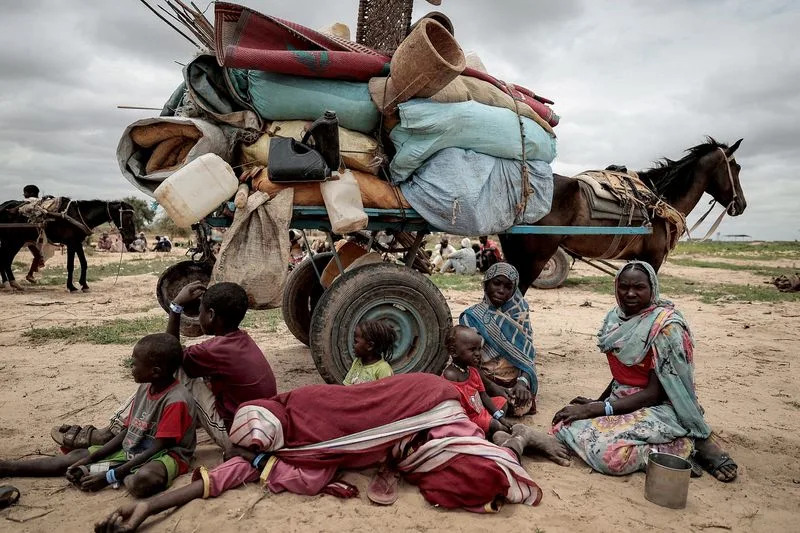US has asked countries in the region to press Iran not to engage in war in Sudan

The U.S. has had direct conversations with countries accused of fueling the conflict in Sudan and has encouraged regional states to press Iran not to engage in the war, U.S. Ambassador to the United Nations Linda Thomas-Greenfield said on Thursday.
Man walks while smoke rises above buildings after aerial bombardment in Khartoum North.
Reuters reported on Wednesday that Iranian-made armed drones had helped the army turn the tide of the conflict, halting the progress of the rival paramilitary Rapid Support Force (RSF) and regaining territory around the capital, according to a senior army source.
Six Iranian sources, regional officials and diplomats - who, like the army source, asked not to be identified because of the sensitivity of the information - also told Reuters the military had acquired Iranian-made unmanned aerial vehicles (UAVs) over the past few months.
"We've had numerous discussions with countries in the region and in those discussions with countries in the region, we've encouraged them to encourage other countries like Iran not to engage," Thomas-Greenfield told reporters at the State Department in Washington ahead of the April 15 anniversary of the conflict in Sudan.
The war has pushed millions into extreme hunger, created the world's largest displacement crisis, and triggered waves of ethnically driven killings and sexual violence in the Darfur region of western Sudan.
U.N. experts have said the RSF war effort has been aided by backing via neighboring African states including Chad, Libya and South Sudan, and that allegations of material support from the United Arab Emirates to the RSF were credible.
The UAE has said its role in Sudan is focused on humanitarian support and calls for de-escalation.
Thomas-Greenfield added that the U.S. has had direct conversations with countries who have been identified as possibly fueling the war, saying that Washington has constant engagement with those named in news reports, including the United Arab Emirates and Egypt.
"We've been making very clear to all partners across the region that escalating the war at this time is something that is going to not only have increasing humanitarian costs, but actually risks destabilization of the entire region," U.S. Special Envoy for Sudan Tom Perriello said.
"Right now is the time that every arms shipment, every bit fueling this conflict is something that pushes us closer to not only famine, but to a failed state."
Iranian drones helping Sudan’s army turn tide of civil war
Officials including Ebrahim Raisi, Iran's president, inspect a drone at a ceremony in Tehran .
Sudan’s army says that it has begun using Iranian-made drones to help regain territory and turn the tide of the country’s civil war.
The newly acquired remote-control vehicles have been used for reconnaissance and artillery spotting during recent army victories in Omdurman across the Nile from the country’s capital, Khartoum.
Iranian officials also told Reuters that the Sudanese armed forces had begun using the drones in the past few months in its war against paramilitary rivals the Rapid Support Forces (RSF).
However, Sudan denied that the unmanned aircraft had been supplied directly by Tehran and their origins were not immediately clear.
Iranian drones have also been widely deployed by armies and militias in countries including Russia, Syria and Yemen.

Ali Sadeq, Sudan’s acting foreign minister who visited Iran last year and is aligned with the army, told Reuters: “Sudan did not obtain any weapons from Iran.”
The Sudanese armed forces used some older drones in the first months of the conflict which erupted in April 2023, but had little success against RSF fighters embedded in Khartoum’s heavily populated neighbourhoods.
The new more effective versions then began operating from the army’s Wadi Sayyidna base north of Khartoum from January, according to eyewitnesses in the area.
“In recent weeks, the army has begun to use precise drones in military operations, which forced the RSF to flee from many areas and allowed the army to deploy forces on the ground,” said Mohamed Othman, a 59-year-old resident of Omdurman’s al-Thawra district.

Tehran’s backing for Sudan’s army is aimed at strengthening ties with the strategically located country, Iranian and regional sources have said.
Sudan sits on the Red Sea, which is a key site of competition between global powers, including Iran, as war rages in the Middle East.
From the other side of the Red Sea, Yemen’s Houthis, armed in part by Iran, have launched attacks in support of Hamas in Gaza.
“What does Iran get in return? They now have a staging post on the Red Sea and on the African side,” said a Western diplomat, who asked not to be named.
US to make additional funding push in response to Sudan conflict
A Sudanese family who fled the conflict in Murnei in Sudan's Darfur region.
The U.S. will make a push of more than a hundred million in additional funding to respond to the conflict in Sudan as Washington seeks to spur international response at a donor conference on the humanitarian crisis this month, the U.S. Special Envoy to the North African country said on Wednesday.
Special Envoy Tom Perriello said he hopes that partners around the world will put greater priority on the Sudanese civil war and that more countries will step up at a donor conference in Paris on April 15.
The date marks a year since the conflict erupted after long-simmering tensions erupted into heavy fighting between the army and the paramilitary Rapid Support Forces (RSF).
"The international response has been pitiful. We're at 5% of the needed amount," said Perriello, adding that the U.S. has already committed over a billion dollars in humanitarian relief to the conflict.
"We'll be doing another nine-figure push around this," he said, without elaborating.
The war has pushed millions into extreme hunger, created the world's largest displacement crisis, and triggered waves of ethnically driven killings and sexual violence in the Darfur region of western Sudan.
Perriello said that the United States will continue to look at actions on the ground and act accordingly to raise costs through sanctions and other means where appropriate. Since the war began, the U.S. has sanctioned the deputy head of the RSF, other major businesses owned by both sides, and other entities.
Perriello also said that peace talks were unlikely to resume on April 18, the date he previously said Washington was eyeing.
Saudi Arabia and the U.S. led unsuccessful talks in Jeddah last year to try to reach a truce.
"I don't think we'll see meetings in Jeddah on the 18th," he said, adding that Washington is not waiting for formal talks to begin but that negotiations are happening every day.
"We would love frankly for the talks to have started last week. But what we know is the Saudis are committed to the talks, to talks that include a broader set of the key actors, and we are hoping that they will commit to a date."
- Questions and Answers
- Opinion
- Story/Motivational/Inspiring
- Technology
- Art
- Causes
- Crafts
- Dance
- Drinks
- Film/Movie
- Fitness
- Food
- Игры
- Gardening
- Health
- Главная
- Literature
- Music
- Networking
- Другое
- Party
- Religion
- Shopping
- Sports
- Theater
- Wellness
- News
- Culture
- War machines and policy




